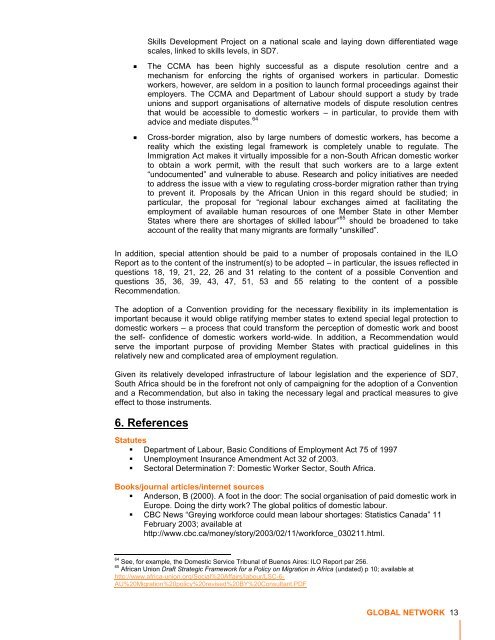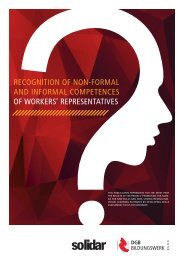domestic workers: decent work for all â south africa - Solidar
domestic workers: decent work for all â south africa - Solidar
domestic workers: decent work for all â south africa - Solidar
Create successful ePaper yourself
Turn your PDF publications into a flip-book with our unique Google optimized e-Paper software.
Skills Development Project on a national scale and laying down differentiated wage<br />
scales, linked to skills levels, in SD7.<br />
• The CCMA has been highly successful as a dispute resolution centre and a<br />
mechanism <strong>for</strong> en<strong>for</strong>cing the rights of organised <strong><strong>work</strong>ers</strong> in particular. Domestic<br />
<strong><strong>work</strong>ers</strong>, however, are seldom in a position to launch <strong>for</strong>mal proceedings against their<br />
employers. The CCMA and Department of Labour should support a study by trade<br />
unions and support organisations of alternative models of dispute resolution centres<br />
that would be accessible to <strong>domestic</strong> <strong><strong>work</strong>ers</strong> – in particular, to provide them with<br />
advice and mediate disputes. 64<br />
• Cross-border migration, also by large numbers of <strong>domestic</strong> <strong><strong>work</strong>ers</strong>, has become a<br />
reality which the existing legal frame<strong>work</strong> is completely unable to regulate. The<br />
Immigration Act makes it virtu<strong>all</strong>y impossible <strong>for</strong> a non-South African <strong>domestic</strong> <strong>work</strong>er<br />
to obtain a <strong>work</strong> permit, with the result that such <strong><strong>work</strong>ers</strong> are to a large extent<br />
―undocumented‖ and vulnerable to abuse. Research and policy initiatives are needed<br />
to address the issue with a view to regulating cross-border migration rather than trying<br />
to prevent it. Proposals by the African Union in this regard should be studied; in<br />
particular, the proposal <strong>for</strong> ―regional labour exchanges aimed at facilitating the<br />
employment of available human resources of one Member State in other Member<br />
States where there are shortages of skilled labour‖ 65 should be broadened to take<br />
account of the reality that many migrants are <strong>for</strong>m<strong>all</strong>y ―unskilled‖.<br />
In addition, special attention should be paid to a number of proposals contained in the ILO<br />
Report as to the content of the instrument(s) to be adopted – in particular, the issues reflected in<br />
questions 18, 19, 21, 22, 26 and 31 relating to the content of a possible Convention and<br />
questions 35, 36, 39, 43, 47, 51, 53 and 55 relating to the content of a possible<br />
Recommendation.<br />
The adoption of a Convention providing <strong>for</strong> the necessary flexibility in its implementation is<br />
important because it would oblige ratifying member states to extend special legal protection to<br />
<strong>domestic</strong> <strong><strong>work</strong>ers</strong> – a process that could trans<strong>for</strong>m the perception of <strong>domestic</strong> <strong>work</strong> and boost<br />
the self- confidence of <strong>domestic</strong> <strong><strong>work</strong>ers</strong> world-wide. In addition, a Recommendation would<br />
serve the important purpose of providing Member States with practical guidelines in this<br />
relatively new and complicated area of employment regulation.<br />
Given its relatively developed infrastructure of labour legislation and the experience of SD7,<br />
South Africa should be in the <strong>for</strong>efront not only of campaigning <strong>for</strong> the adoption of a Convention<br />
and a Recommendation, but also in taking the necessary legal and practical measures to give<br />
effect to those instruments.<br />
6. References<br />
Statutes<br />
• Department of Labour, Basic Conditions of Employment Act 75 of 1997<br />
• Unemployment Insurance Amendment Act 32 of 2003.<br />
• Sectoral Determination 7: Domestic Worker Sector, South Africa.<br />
Books/journal articles/internet sources<br />
• Anderson, B (2000). A foot in the door: The social organisation of paid <strong>domestic</strong> <strong>work</strong> in<br />
Europe. Doing the dirty <strong>work</strong>? The global politics of <strong>domestic</strong> labour.<br />
• CBC News ―Greying <strong>work</strong><strong>for</strong>ce could mean labour shortages: Statistics Canada‖ 11<br />
February 2003; available at<br />
http://www.cbc.ca/money/story/2003/02/11/<strong>work</strong><strong>for</strong>ce_030211.html.<br />
64 See, <strong>for</strong> example, the Domestic Service Tribunal of Buenos Aires: ILO Report par 256.<br />
65 African Union Draft Strategic Frame<strong>work</strong> <strong>for</strong> a Policy on Migration in Africa (undated) p 10; available at<br />
http://www.<strong>africa</strong>-union.org/Social%20Affairs/labour/LSC-6-<br />
AU%20Migration%20policy%20revised%20BY%20Consultant.PDF<br />
GLOBAL NETWORK 13
















